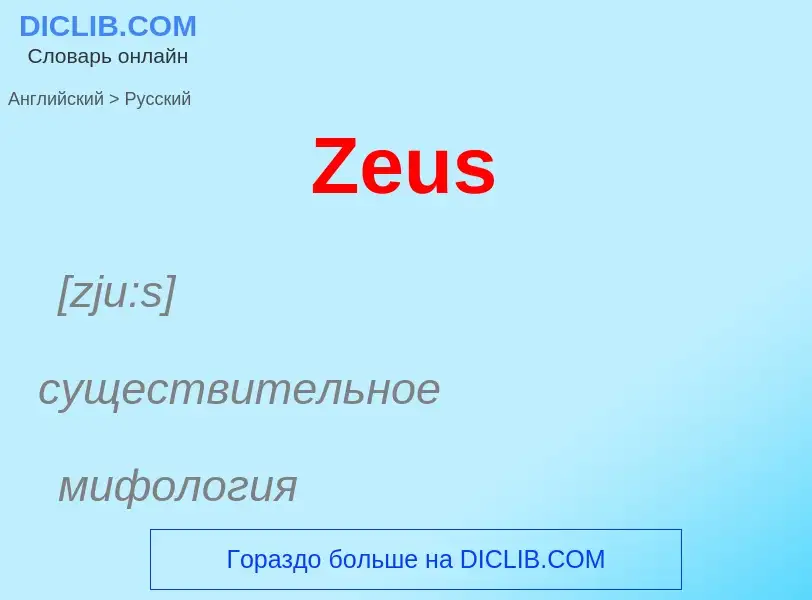Übersetzung und Analyse von Wörtern durch künstliche Intelligenz ChatGPT
Auf dieser Seite erhalten Sie eine detaillierte Analyse eines Wortes oder einer Phrase mithilfe der besten heute verfügbaren Technologie der künstlichen Intelligenz:
- wie das Wort verwendet wird
- Häufigkeit der Nutzung
- es wird häufiger in mündlicher oder schriftlicher Rede verwendet
- Wortübersetzungsoptionen
- Anwendungsbeispiele (mehrere Phrasen mit Übersetzung)
- Etymologie
Zeus - Übersetzung nach russisch
[zju:s]
существительное
мифология
Зевс
общая лексика
солнечник (Zeus)
обыкновенный солнечник (Zeus faber)
Definition
Wikipedia

Zeus (Ζεύς) is the sky and thunder god in ancient Greek religion, who rules as king of the gods on Mount Olympus. His name is cognate with the first element of his Roman equivalent Jupiter. His mythology and powers are similar, though not identical, to those of Indo-European deities such as Jupiter, Perkūnas, Perun, Indra, Dyaus, and Zojz.
Zeus is the child of Cronus and Rhea, the youngest of his siblings to be born, though sometimes reckoned the eldest as the others required disgorging from Cronus's stomach. In most traditions, he is married to Hera, by whom he is usually said to have fathered Ares, Eileithyia, Hebe, and Hephaestus. At the oracle of Dodona, his consort was said to be Dione, by whom the Iliad states that he fathered Aphrodite. According to the Theogony, Zeus' first wife was Metis, by whom he had Athena. Zeus was also infamous for his erotic escapades. These resulted in many divine and heroic offspring, including Apollo, Artemis, Hermes, Persephone, Dionysus, Perseus, Heracles, Helen of Troy, Minos, and the Muses.
He was respected as an allfather who was chief of the gods and assigned roles to the others: "Even the gods who are not his natural children address him as Father, and all the gods rise in his presence." He was equated with many foreign weather gods, permitting Pausanias to observe "That Zeus is king in heaven is a saying common to all men". Zeus' symbols are the thunderbolt, eagle, bull, and oak. In addition to his Indo-European inheritance, the classical "cloud-gatherer" (Greek: Νεφεληγερέτα, Nephelēgereta) also derives certain iconographic traits from the cultures of the ancient Near East, such as the scepter. Zeus is frequently depicted by Greek artists in one of three poses: standing, striding forward with a thunderbolt leveled in his raised right hand, or seated in majesty. It was very important for the lightning to be exclusively in the god's right hand as the Greeks believed that people who were left-handed were associated with bad luck.


![Tivoli]] and donated to the British Museum by [[John Thomas Barber Beaumont]] in 1836. BM 1516. (British Museum, ''A Catalogue of Sculpture in the Department of Greek and Roman Antiquities'', 1904).</ref> Tivoli]] and donated to the British Museum by [[John Thomas Barber Beaumont]] in 1836. BM 1516. (British Museum, ''A Catalogue of Sculpture in the Department of Greek and Roman Antiquities'', 1904).</ref>](https://commons.wikimedia.org/wiki/Special:FilePath/Bust of Zeus.jpg?width=200)

![Wheel of the Law]], symbol of [[Buddhism]] (right, coin of [[Menander II]] 90–85 BC). Wheel of the Law]], symbol of [[Buddhism]] (right, coin of [[Menander II]] 90–85 BC).](https://commons.wikimedia.org/wiki/Special:FilePath/Evolution of Zeus Nikephoros on Indo-Greek coinage.jpg?width=200)
![James Barry]], 1773 (City Art Galleries, Sheffield.) James Barry]], 1773 (City Art Galleries, Sheffield.)](https://commons.wikimedia.org/wiki/Special:FilePath/James Barry 001.jpg?width=200)
![''Jupiter, disguised as a shepherd, tempts Mnemosyne'' by [[Jacob de Wit]] (1727) ''Jupiter, disguised as a shepherd, tempts Mnemosyne'' by [[Jacob de Wit]] (1727)](https://commons.wikimedia.org/wiki/Special:FilePath/Jupiter, vermomd als herder, verleidt Mnemosyne, godin van het geheugen Rijksmuseum SK-A-3886.jpeg?width=200)
![Marble eagle from the sanctuary of ''Zeus Hypsistos'', [[Archaeological Museum of Dion]]. Marble eagle from the sanctuary of ''Zeus Hypsistos'', [[Archaeological Museum of Dion]].](https://commons.wikimedia.org/wiki/Special:FilePath/Marble eagle with open wings, from the sanctuary of Zeus Hypsistos, Archaeological Museum, Dion (7080054119).jpg?width=200)

![Laurel-wreathed]] head of Zeus on a gold [[stater]], [[Lampsacus]], c 360–340 BC ([[Cabinet des Médailles]]). Laurel-wreathed]] head of Zeus on a gold [[stater]], [[Lampsacus]], c 360–340 BC ([[Cabinet des Médailles]]).](https://commons.wikimedia.org/wiki/Special:FilePath/Stater Zeus Lampsacus CdM.jpg?width=200)

![wstitle=Gaza}}; [http://www.plekos.uni-muenchen.de/2004/rhahn.html Johannes Hahn: Gewalt und religiöser Konflikt]; [http://philologos.org/__eb-thlatb/chap08.htm#mosue The Holy Land and the Bible]</ref> was the chief divinity of Gaza ([[Istanbul Archaeology Museum]]). wstitle=Gaza}}; [http://www.plekos.uni-muenchen.de/2004/rhahn.html Johannes Hahn: Gewalt und religiöser Konflikt]; [http://philologos.org/__eb-thlatb/chap08.htm#mosue The Holy Land and the Bible]</ref> was the chief divinity of Gaza ([[Istanbul Archaeology Museum]]).](https://commons.wikimedia.org/wiki/Special:FilePath/Statue of Zeus dsc02611-.jpg?width=200)

![Wedding of Zeus and Hera on an antique fresco from [[Pompeii]] Wedding of Zeus and Hera on an antique fresco from [[Pompeii]]](https://commons.wikimedia.org/wiki/Special:FilePath/Wall painting - wedding of Zeus and Hera - Pompeii (VI 8 3) - Napoli MAN 9559 - 01.jpg?width=200)
![1st century BC statue of Zeus<ref>[[J. Paul Getty Museum]] [https://www.getty.edu/art/collection/object/103QST 73.AA.32].</ref> 1st century BC statue of Zeus<ref>[[J. Paul Getty Museum]] [https://www.getty.edu/art/collection/object/103QST 73.AA.32].</ref>](https://commons.wikimedia.org/wiki/Special:FilePath/Zeus Getty Villa.jpg?width=200)
![Late Archaic]] terracotta, 480-470 BC) Late Archaic]] terracotta, 480-470 BC)](https://commons.wikimedia.org/wiki/Special:FilePath/Zeus abducts Ganymede, large terracotta, before 470 BC, AM Olympia, Olym26.jpg?width=200)


.jpg?width=200)

.jpg?width=200)


![John Dory, by [[William MacGillivray]], c. 1840 John Dory, by [[William MacGillivray]], c. 1840](https://commons.wikimedia.org/wiki/Special:FilePath/MacGillivray, William John Dory.jpg?width=200)
